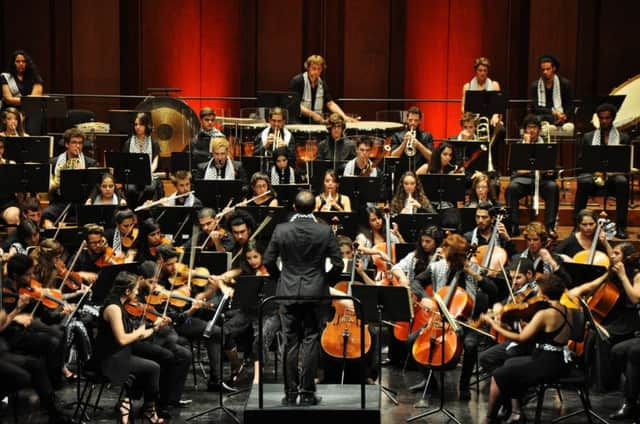Classical review: Palestine Youth Orchestra, Glasgow Royal Concert Hall


Palestine Youth Orchestra | Rating: **** | Glasgow Royal Concert Hall
It’s an ensemble defined by cultural identity rather than simple geographical location – and even, perhaps, by a sense of quiet defiance. As PYO founder Suhail Khoury explained in his introduction to the Orchestra’s Glasgow concert – the second in a UK-wide tour – two teenage musicians had been prevented from taking part when Israeli authorities refused to allow them exit permits from Gaza.
Advertisement
Hide AdAdvertisement
Hide AdSo there was an unusually hefty burden on the shoulders of these young musicians – not only to showcase their own musical skills, but also to demonstrate confidence in their cultural identity, and to celebrate the music of a nation better known to non-Palestinian listeners for reports of conflict. And under the cool direction of UK conductor Sian Edwards, they carried it off magnificently.
OK there were a few frayed edges, moments where ensemble slipped or a soloist wavered. But none of that seemed to matter in the light of the young musicians’ energetic, enthusiastic playing, and evident joy in making music.
They attacked their opening Beethoven Leonora Overture No. 3 with verve and vigour – and the relevance of a work about a political prisoner struggling against injustice can’t have been lost on players or listeners. Graham Fitkin’s bright, poppy Metal, was tight and sparkling, and their concert closer, Mussorgsky’s Pictures at an Exhibition in Ravel’s glittering orchestration, was a strong choice to showcase the talents of individual player.
But it was in three Arabic songs that the Orchestra really came into its own, for which they were joined by singer Nai Barghouti, who injected as much expression into a single note as most vocalists manage in a whole song. The highlight was the intense focus of devotional song ‘Bi Ridhak ya Khaliqi’, for which the orchestra slimmed down to a trio of leader Layth Sidiq, principal cellist Naseem Atrash and first-desk violinist Mostafa Saad, who swapped his fiddle for an oud and gave a seductive, rippling solo.
Maybe it wasn’t about defiance after all – perhaps simply celebration, albeit against the odds.